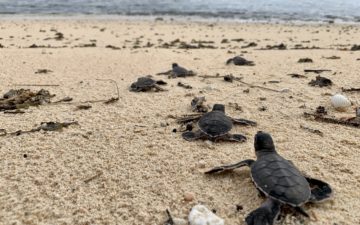As a college student who recently entered her 20s, I often find myself asking, “What could I possibly do for the ocean?”
The ocean has been a big passion of mine since I was really young, like most of us who work with The Ocean Foundation. However, I grew up in the middle of Ohio with no body of water in sight (unless you count Lake Erie, which, if you ask any ten-year-old, is NOT the same as the ocean). I did all of the normal things at the beach growing up—building sandcastles, walking along the shore, and nearly getting taken out by the waves every time I got in the water—but it wasn’t until about high school that I learned about the effects that we have on the ocean.
As you could probably guess, it started with a video about how detrimental plastic is to sea turtles. I think I bought a 12-pack of metal straws that same day. At first, it was really encouraging to see people around me care for the ocean in that way. But then, no more than about six months later, the same people who I thought were with me in this fight were complaining about paper straws at restaurants and using too many plastic bags to carry their groceries home. I knew that the fight wouldn’t be over with just a few quick fixes that most people give up on by the second week.
Who knew saving the planet could be so much like setting New Year’s resolutions?
Regardless, I decided my personal fight wouldn’t end there. Throughout the rest of high school and into college, I have consciously asked the question “What does it mean to be sustainable?” Furthermore, how could I possibly do anything to help save the ocean if I’m not living on an island in the middle of it?
One thing I’ve found myself doing in recent years is simply buying less. When everything is said and done, it’s surprising how I really don’t need as much as I think I do. It can be as simple as only buying items of clothing that I know I will wear far into the future, not just whatever is trendy on a fast fashion site at the time. Narrowing my life down to experiences rather than material possessions has helped me tremendously when I used to get rid of things I just bought the month before.
This brings on the question that a lot of you might be thinking right now: “That’s great for you, but how can I become more sustainable?” because sustainability does not look the same for everyone. And, we can all attest to the fact that it is often a lot cheaper to buy single-use items than reusable ones.
While providing a guide on consumer sustainability is beyond the scope of our work at The Ocean Foundation, I’ve personally compiled a list of things that you can do for the ocean, and to become a more sustainable individual. This list is especially geared toward young people and those still in college, as I believe that’s the hardest time to actually achieve sustainability. So, without further ado, here are some ideas for you:
- Sustainable Shopping
Instead of using the plastic grocery bags when you go to the store, bring your own tote! Reusable shopping bags are so cheap (I’m talking like $1 a bag, plus they’re BIG) and will save so much plastic in the long run. Something I like to do too is simply not use a bag at all. If I’m getting something small that I can carry in my hand, I tend to just carry it out of the store with the receipt rather than using a bag.
- Shop Local
Yes, fast fashion is very trendy and affordable. I get it! However, you can often get quality clothing from thrift stores (affordable!) and local boutiques, and there’s nothing wrong with being a little bit more unique with your style.
- Quality > Quantity – Check the label!
When you run out of shampoo, rather than buying another cheap container in bulk, look for the ones that have greener ingredients. Often, when you really look at what’s in your products, you will inevitably lead a healthier lifestyle—and who wouldn’t want that? Not to mention, all of the ingredients that you don’t want going on your body will go down the drain and ultimately harm the ocean and its surrounding environments.
- Donate
Let’s be honest, we all have things lying around our house (or dorm) that we simply don’t need and won’t use. Donating things to local charities is a great way to give your items new life and someone else may be able to get something that they really do need.
- Repurpose Old Containers
Do you have candles that are almost out of wax? Or food jars that you just used up? A fun way to get creative and have new decor that you don’t have to buy is to reuse containers like this as vases for flowers or storage! Grab some paint, or you can use them as is—either way, it’s a great option to have unique and sustainable home decor.
- Use Public Transportation
This certainly isn’t an option for everyone, but if you live in a big city and still drive everywhere, consider biking or using public transport. It is way safer for the environment (and a money saver! Have you seen gas prices lately?) and can honestly be a fun way to reduce carbon emissions coming from your vehicle while experiencing something new.
- Take Advantage of Natural Light
During the day, turning off lights that aren’t completely necessary is a great way to conserve energy and in turn feel the effects of the sunlight flooding into your house, which personally makes me feel a lot better.
- Join a Sustainability Club
The last thing I’ll suggest is joining a local sustainability club! This is a great opportunity to be held accountable for your sustainability efforts in order to really make a difference for the environment.
These are my suggestions, and a few things that I like to do in my daily life to help conserve the environment, especially since I don’t live right next to the ocean. I’ve seen that these small steps can actually make a big difference in my life, and I hope that they can encourage you to do the same!
Ultimately, it is up to our society as a whole to fix these issues, so it’s important not to put too much pressure on yourself as an individual. But sometimes even the work of one person can inspire others around you to make a difference.







